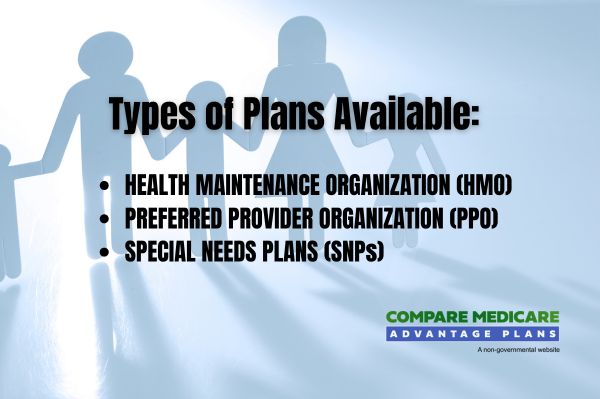United Healthcare Medicare Advantage Plans
Curious about the potential United Healthcare Medicare Advantage Plans? These plans bundle Medicare Part A, Part B, and sometimes Part D, possibly offering comprehensive coverage. Some plans may also include extra benefits like dental, vision, and prescription drug coverage. This article will explore the types of plans that may be available, possible benefits, and how they compare to Original Medicare.
Key Takeaways
- UnitedHealthcare Medicare Advantage Plans could serve as an alternative to Original Medicare, bundling Parts A, B, and occasionally D. Some plans may also include additional benefits like dental, hearing, and vision care.
- The plans come in various types including HMO, PPO, and Special Needs Plans (SNPs), each catering to different healthcare needs and offering varying levels of provider flexibility.
- Members of UnitedHealthcare Medicare Advantage Plans may experience lower out-of-pocket costs and enhanced benefits compared to Original Medicare.
Compare Plans in One Step!
Enter Zip Code
What Are UnitedHealthcare Medicare Advantage Plans?

UnitedHealthcare Medicare Advantage Plans, also known as Medicare Advantage Part C, could provide an alternative way for Medicare beneficiaries to receive certain benefits. Unlike Original Medicare, these plans bundle Medicare Part A (hospital insurance) and Part B (medical insurance) into a single plan, occasionally including additional benefits not covered by Original Medicare.
One of the potential features of some UnitedHealthcare plans might be access to a network of doctors and hospitals, allowing for both in-network and out-of-network care, depending on the plan type. With a variety of plan types and potential perks, UnitedHealthcare Medicare Advantage Plans will likely be designed to enhance the healthcare experience for Medicare patients.
Types of UnitedHealthcare Medicare Advantage Plans

UnitedHealthcare will likely offer a range of Medicare Advantage Plans, each designed to cater to different healthcare needs and preferences. From Health Maintenance Organization (HMO) plans, which require using a network of doctors and hospitals, to Preferred Provider Organization (PPO) plans that offer more flexibility, there’s a Medicare Advantage Organization to suit almost everyone.
Additionally, Special Needs Plans (SNPs) provide tailored coverage for individuals with specific health conditions. Understanding the differences between these plans could help you choose the best option for your healthcare needs.
HMO Plans
Health Maintenance Organization (HMO) plans from UnitedHealthcare are designed to keep healthcare costs low by requiring members to use a network of doctors and hospitals. Members must select a primary care physician who coordinates their care and provides referrals to specialists when needed. This structured approach helps manage healthcare expenses but may limit flexibility in provider choice.
HMO plans often offer comprehensive coverage, including preventive services and wellness programs. Focusing on in-network providers allows these plans to negotiate better rates, possibly resulting in lower out-of-pocket costs for insured members.
For those who prefer a coordinated care approach and lower premiums, HMO plans can be an excellent choice.
PPO Plans
Preferred Provider Organization (PPO) plans provide greater flexibility in choosing healthcare providers. Unlike HMO plans, PPO members can see any doctor or specialist without needing a referral, making it easier to access the care they need. While members are encouraged to use in-network providers to keep costs down, they also have the option to seek care outside the network, albeit at higher out-of-pocket expenses.
This flexibility might make PPO plans an attractive option for those who want more control over their healthcare choices. Offering the ability to see any Medicare-accepting doctor, PPO plans strike a balance between cost and convenience, catering to individuals who value accessibility and provider choice.
SNP Plans
Special Needs Plans (SNPs) are specifically designed for individuals with certain chronic conditions, disabilities, or those living in institutions. These plans offer tailored benefits and services to meet the unique healthcare needs of their members. By focusing on specific health conditions, SNPs ensure that beneficiaries receive the appropriate care and support, enhancing their overall health outcomes.
Possible Benefits of Choosing UnitedHealthcare Medicare Advantage Plans

Choosing a UnitedHealthcare Medicare Advantage Plan may come with numerous benefits that could go beyond what Original Medicare offers. Some plans may include additional services such as dental, vision, and hearing care, which might not be covered by Original Medicare.
Additional Benefits
One of the possible reasons to consider UnitedHealthcare Medicare Advantage Plans might be due to the extensive range of additional benefits some plans might offer. These plans might combine Medicare Parts A and B with added services like vision, dental, and hearing coverage. Some of these benefits may include coverage for routine dental check-ups, eyeglasses, and hearing aids, which could reduce out-of-pocket expenses for these essential services.
Prescription Drug Coverage

Prescription drug coverage could be a critical component for certain UnitedHealthcare Medicare Advantage Plans. The potential integration of Medicare Part D could potentially ensure that members have access to necessary medications without the need for a separate Medicare prescription drug plan. This possible integration may also simplify the process of managing prescriptions and may even lead to significant cost savings.
Ensuring access to affordable medications could be vital for maintaining health, especially for those with chronic conditions. Some UnitedHealthcare Medicare Advantage Plans may help mitigate the financial burden of prescription drugs, making it easier for beneficiaries to adhere to their treatment regimens within the federal Medicare program.
Lower Out-of-Pocket Costs
Another potential benefit of UnitedHealthcare Medicare Advantage Plans could be the possible integration of lower out-of-pocket costs compared to Original Medicare. Certain plans may include additional services and negotiated rates, which could lead to significant savings on healthcare expenses. Members may also experience reduced costs for hospital stays, doctor visits, and other medical services, possibly providing financial relief and peace of mind.
Moreover, while some Medicare Advantage plans might not include monthly premiums, members still pay the standard Part B premium. However, the overall cost structure, including premiums, deductibles, and copayments, may vary significantly based on the specific plan and benefits offered. Careful evaluation of these various factors could help beneficiaries determine their total out-of-pocket expenses and choose the most cost-effective plan.
Comparing UnitedHealthcare Medicare Advantage to Original Medicare

When comparing UnitedHealthcare Medicare Advantage Plans to Original Medicare, several differences might stand out. UnitedHealthcare’s plans combine Medicare Part A, Part B, and sometimes Part D into a single policy, possibly offering more comprehensive coverage than Original Medicare. The potential integration of Part D could simplify healthcare management and allow easier access to necessary medications.
Additionally, some UnitedHealthcare Medicare Advantage Plans may also include services not covered by Original Medicare, such as dental and vision care. However, these plans will likely have a network of providers, which might restrict access to care compared to the broader network offered by Original Medicare. Costs may also vary, with different cost-sharing requirements for hospital services and other medical needs.
How to Enroll in a UnitedHealthcare Medicare Advantage Plan
Enrolling in a UnitedHealthcare Medicare Advantage Plan is a straightforward process that begins with checking eligibility and reviewing available options. Qualification requires enrollment in both Medicare Part A and Part B.
The enrollment process involves providing personal information and choosing a plan that meets your healthcare needs. To enroll, call one of our licensed agents at 1-833-641-4938 (TTY 711), Mon-Fri 8 am-9 pm EST.
They can provide comprehensive information, personalized guidance, and ongoing assistance to navigate the enrollment process for private insurance companies, making it easier for beneficiaries to make informed decisions about their healthcare.
Enter Your Zip Code
To find the Medicare Advantage plans available in your local area, enter your zip code into any of the zip code boxes on this website. You can:
- Compare different Medicare Advantage and Prescription Drug Plans
- Focus on drug coverage and costs to find the perfect fit for your healthcare needs
- Input your information and sort through a variety of plans
- Weigh the pros and cons of each based on your situation
Entering your zip code allows you to view and compare plans that best suit your healthcare needs.
Consulting a Licensed Insurance Agent
Consulting one of our licensed insurance agents can provide personalized assistance in selecting the most suitable Medicare Advantage plan. These professionals offer guidance based on your specific health needs, ensuring that you choose a plan that aligns with your healthcare requirements.
Meeting with a licensed insurance agent provides tailored advice and support throughout the enrollment process.
Understanding Medicare Advantage Part C
Medicare Advantage Part C plans, offered by private insurance companies like UnitedHealthcare, could provide an alternative to Original Medicare. These plans bundle Medicare Part A, Part B, and sometimes Part D into a single policy, possibly offering comprehensive coverage and sometimes additional benefits. Participants must seek services from doctors within the Medicare Advantage network to receive coverage for non-emergency care.
Understanding the structure and potential benefits of Medicare Advantage Part C could be crucial for making informed healthcare decisions. Some of these plans may also include extra benefits not covered by Original Medicare, such as dental, vision, and hearing coverage, possibly enhancing the overall value for beneficiaries.
The Role of UnitedHealthcare Insurance Company in Medicare Advantage
UnitedHealthcare will likely play a significant role in the Medicare Advantage market, offering plans across several states and Washington, D.C. This extensive reach could make UnitedHealthcare an accessible option for a vast majority of Medicare beneficiaries. The company’s Medicare Advantage plans have been designed to provide comprehensive coverage, sometimes including additional benefits not offered by Original Medicare.
AARP Medicare Supplement Plan vs. AARP Medicare Advantage Plans in 2026
AARP Medicare Supplement Plans, also known as Medigap, will likely be designed to potentially cover costs that Original Medicare does not, such as certain deductibles and co-insurance. To enroll in an AARP Medicare Supplement plan, one must be an AARP member, which may require a yearly fee.
While AARP Medicare Supplement Plans may be available in a majority of the states, some of the UnitedHealthcare Medicare Advantage Plans may offer wider availability, possibly making them a more accessible option for many beneficiaries.
Addressing Common Concerns About UnitedHealthcare Medicare Advantage Plans
As with any healthcare plan, there will likely be various concerns that potential enrollees may have about UnitedHealthcare Medicare Advantage Plans. Some of these concerns might include the renewal of the plan’s contract and additional cost considerations.
Addressing these issues could help beneficiaries make more informed decisions about their healthcare coverage.
Plan’s Contract Renewal
The renewal of a Medicare Advantage plan’s medicare contract is crucial as it determines the continuation of benefits and coverage for enrollees in the upcoming year. If a plan’s contract is not renewed, beneficiaries may need to find alternative coverage, which can be a significant concern for those relying on specific benefits.
Additional Cost Considerations

Some Medicare Advantage plans may offer additional benefits that might not include extra premiums, possibly making them financially appealing to beneficiaries. Unlike traditional Medicare, some plans might have an out-of-pocket maximum, which could provide financial protection against high healthcare costs.
However, the cost structure may vary significantly based on the specific plan design and possible benefits offered. Understanding these additional cost considerations could help beneficiaries manage their healthcare expenses more effectively.
Summary
UnitedHealthcare Medicare Advantage Plans will likely offer a robust alternative to Original Medicare, combining comprehensive coverage with potential benefits such as dental, vision, and prescription drug coverage. By understanding the types of plans available, the enrollment process, and the potential cost savings, beneficiaries can make informed decisions about their healthcare needs.
Whether you prefer the structured care of HMO plans, the flexibility of PPO plans, or the tailored benefits of SNPs, there will likely be a UnitedHealthcare Medicare Advantage Plan to suit your needs.
Choosing the right Medicare plan is a crucial decision that could impact your healthcare experience and financial well-being. UnitedHealthcare’s possible offerings and commitment to providing quality care will likely make its Medicare Advantage Plans a compelling option for many beneficiaries. By leveraging the resources and support available, you can navigate your Medicare journey with confidence and peace of mind.
Frequently Asked Questions
→ What are the potential benefits of UnitedHealthcare Medicare Advantage Plans?
Some UnitedHealthcare Medicare Advantage Plans may provide comprehensive coverage with additional benefits, such as dental, vision, and prescription drug coverage, possibly enhancing the overall healthcare experience beyond what Original Medicare offers. This could potentially ensure that members have access to essential services for better health management.
→ How do I enroll in a UnitedHealthcare Medicare Advantage Plan?
To enroll in a UnitedHealthcare Medicare Advantage Plan, ensure you are already enrolled in both Medicare Part A and Part B. Then, consult one of our licensed insurance agent for assistance by calling 1-833-641-4938 (TTY 711), Mon-Fri 8 am-9 pm EST.
→ What is the difference between HMO and PPO plans?
HMO plans necessitate using a network of providers and obtaining referrals for specialists, whereas PPO plans offer greater flexibility in choosing healthcare providers without needing referrals. This distinction could significantly impact your access to care and potential costs.
→ Are prescription drugs covered under UnitedHealthcare Medicare Advantage Plans?
Yes, some UnitedHealthcare Medicare Advantage Plans might integrate prescription drug coverage as part of Medicare Part D, possibly ensuring you have access to essential medications.
→ What should I consider regarding plan contract renewals?
Members should review the terms of their plan contract renewals carefully, as they could affect their potential benefits and coverage for the upcoming year. Beneficiaries should also be mindful that non-renewal might necessitate finding alternative coverage options.

UNITED HEALTHCARE MEDICARE ADVANTAGE PLAN BY STATE
Indiana
Iowa
Kansas
Kentucky
Louisiana
Maine
Maryland
Massachusetts
Michigan
Minnesota
Mississippi
Missouri
Montana
Nebraska
Nevada
New Hampshire
New Jersey
New Mexico
Rhode Island
ZRN Health & Financial Services, LLC, a Texas limited liability company



